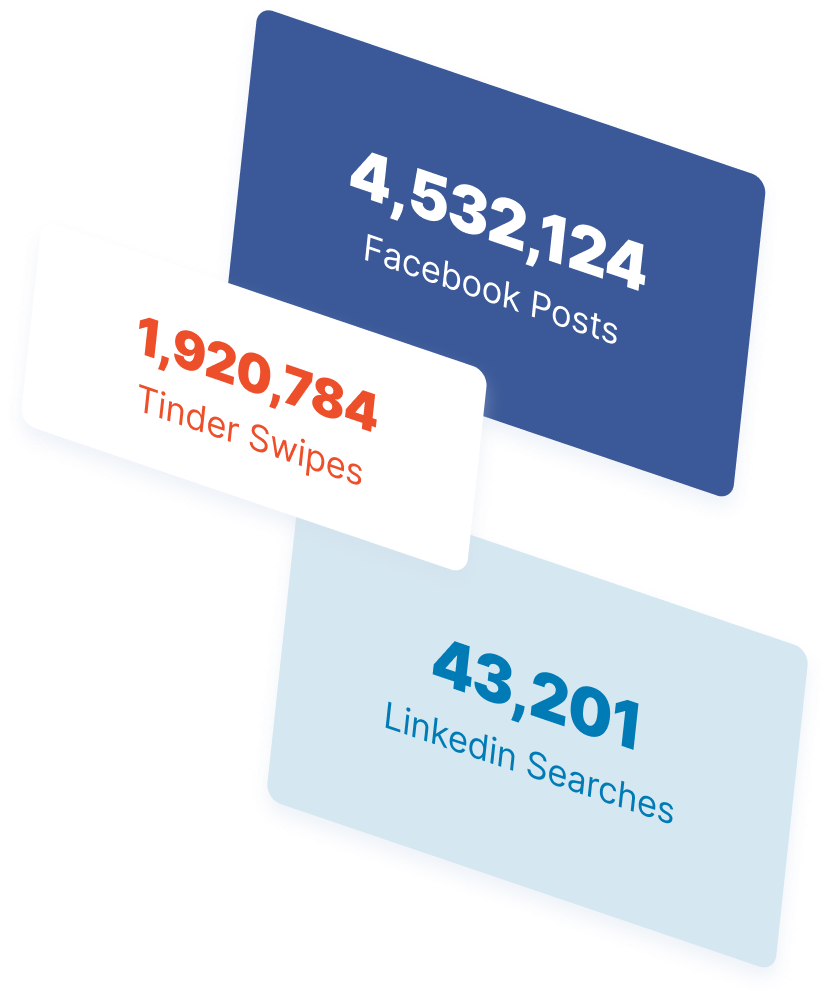-
 12 min. read
12 min. read
-
 Trevin Shirey
Trevin Shirey VP of Marketing
VP of Marketing
- Trevin serves as the VP of Marketing at WebFX. He has worked on over 450 marketing campaigns and has been building websites for over 25 years. His work has been featured by Search Engine Land, USA Today, Fast Company and Inc.
Google processes about 3 billion queries per day which is part of what makes it such a valuable marketing tool. But there are search engines other than Google in the world. Google has lots of competitors, and they all have their own share of the search market.
For example, Yahoo! has 309 million searches per day and Bing has 134 million. They’re both still a far cry from 3 billion — that’s not even half a billion between the two of them — but that’s still a lot of potential customers that could come to your business.
Yahoo! and Bing are just two examples, too — search engine users have more alternatives than just those two. You just have to know what they are so you can target them.
#1. DuckDuckGo
Searches per day: ~10 million (2015)
The first contender on our alternative search engine list is DuckDuckGo. DuckDuckGo is one of the most famous alternative search engines in the world because of how much it hates user tracking. That’s DDG’s primary selling point, actually — and they stress it as much as they can to get new users.
On top of that, DDG is just a good search engine. And despite Google’s overwhelming market share, it fields millions of searches every day. In fact, you can check DDG’s stats on their searches over the past few years to see how well they’re doing now.
For users, DDG adds a nice little graphic next to search results that they’ve already visited, meaning you have an opportunity to stick out to returning traffic.  As a company, DDG practices what it preaches about privacy. They have the highest possible ratings for SSL encryption, so their site as a whole is as secure as possible — at least as far as SSL is concerned.
As a company, DDG practices what it preaches about privacy. They have the highest possible ratings for SSL encryption, so their site as a whole is as secure as possible — at least as far as SSL is concerned.
How do you rank in DuckDuckGo?
While DDG likes to talk about how different it is from Google in practice, its SEO standards are pretty similar.
Basically, you just have to get links. And in their words, you should get them “from high quality sites like Wikipedia.” Whether that means Wikipedia links count in DDG SEO isn’t 100% clear, but it’s probably a safe bet. DDG also uses semantic search (like Google’s Hummingbird) to determine user intent, and it includes some element of local search, even though it’s not as accurate as Google.
After all, DDG doesn’t have separate properties for business listings or NAP information, so of course it’s going to be less precise for users. If you’d like to improve your reach on DDG, you can take out ads on Bing since they run on the same advertising system. That kind of partnership might raise a few eyebrows concerning DDG’s integrity, but as far as businesses are concerned, it’s an easy way to advertise.
All of this means that you can still find success online through DuckDuckGo, especially since its SEO standards are so similar to Google and its PPC ads come from Bing.
#2. Ixquick
Searches per day: ~2 million (2012)
Ixquick is another privacy-centric search engine that brags it’s “the world’s most private search engine.” Regardless of how Ixquick determined that distinction, it has a number of distinctions that back it up as an ultra-private search engine, not to mention the highest possible rating for SSL encryption (like DDG). Interestingly, Ixquick doesn’t appear to have any site crawlers of its own. Instead, it pulls results from other search engines, including Yahoo!, Google, and Gigablast (to name a few) all at once.
That pretty much makes it a search engine of search engines — a meta search engine — since it doesn’t actually rank individual pages. It just ranks search results from other search engines. On the plus side, that means Ixquick takes the best search results from every search engine, ranks them according to its own algorithm, and lists them accordingly.
They even offer a little star next to search results that are in another search engine’s top 10 for a keyword. So from a user perspective, they literally get the best of the best. From a business perspective, your competition has never been stiffer.
But if you’re in the top 10 search results for a keyword that matters to your industry, you can get some great publicity. 
How do you rank in Ixquick?
You rank well on other search engines. In that respect, ranking on Ixquick isn’t really an obstacle — it’s a reward.
Once you prove to your audience (and Google) that you’re a reliable source, Ixquick’s users will start to see you that way too. So all you have to do is concentrate on one search engine at a time to get the results you want. And if you feel like paying for ads, you can run a campaign in AdWords.
Ixquick uses ads straight from Google. 
#3. Yandex
Searches per day: ~154 million (2013)
Yandex is the Russian equivalent of Google, and it controls about 60% of the search market share in and around Russia. This might not be a big deal for anyone who sells primarily in the United States — but for international businesses, it has the potential for some big payoffs. Yandex is laid out a lot like Google, and it does pretty much everything you’d expect from a big-name search engine.
It even has an app-specific promotion platform for startups and tech companies that want to promote apps only.  But while it looks a little like Google, it doesn’t operate quite the same way. First, Yandex’s PageRank equivalent is called the Thematic Index Citation (TIC) score, and it runs on a scale from zero to 10,000.
But while it looks a little like Google, it doesn’t operate quite the same way. First, Yandex’s PageRank equivalent is called the Thematic Index Citation (TIC) score, and it runs on a scale from zero to 10,000.
On top of that, Yandex only indexes sites every once in a while, as opposed to Google, which indexes everything almost constantly. That means if you target Yandex, your rankings will update much more slowly than they would on Google (unless you run a frequent blog). You also can’t just target an area with content.
To target locations on Google, you can create a landing page for a location and show up for the keyword that you want. But on Yandex, you have to modify your webmaster settings for geotargeting. Plus, Yandex weighs on-site factors differently than Google.
The length of content, importance of single pages, and other criteria simply don’t matter as much as they do to Google. For all their differences though, Yandex still has the same objective as Google — create a great user experience.
How do you rank on Yandex?
Right now, Google pretty much maintains the highest SEO standards of any search engine. So if you rank well on Google, you’ll probably rank well on Yandex, too.
But if you’re specifically targeting customers in and around Russia, you have some work ahead of you. That work will be pretty similar to how you’d perform geo-targeting on Google, but it’s essential that you change your webmaster settings on Yandex before pursuing any Russian or Eastern European locations. It would probably also help to write in Russian, Ukrainian, or another dominant regional language that your target audience understands.
(That’ll also include writing in the correct Cyrillic alphabet.) As common as English is, you can’t beat the reach that you get when you appeal to a group of people in their native language.
#4. Dogpile
Searches per day: Undisclosed
Back in the 1990s, Dogpile was a big deal. In terms of search engine quality, it was up there with AltaVista, Alltheweb, Yahoo, and Google itself. Dogpile actually pre-dates Google by about two years, but it’s never hit the same level of fame or distinction.
The reason is because Dogpile isn’t trying to be a search engine anymore — it’s upped its game to meta-search, just like Ixquick. It also uses a lot of paid ads — as many as 10 on a page — to keep its revenue growing. That’s not to say it’s a bad idea to rank organically on Dogpile.
It’s just another way you can earn and maintain a top position in search queries you’re already dominating. And beyond that, it’s a way you can rank higher for certain queries that don’t perform well on Google, but do perform well on Yahoo! That’s because Dogpile’s engineering team discovered there’s minimal overlap among search results from different search engines.
Basically, Google, Yahoo!, and Bing all show a unique listing based on their own algorithms. So instead of creating yet another search algorithm, they decided to ping the existing search engines and rank results accordingly.
How do you rank on Dogpile?
Rank well anywhere — and everywhere — else. It’s worth mentioning that the same page won’t show up multiple times if it ranks well on multiple search engines.
Dogpile’s engineers made sure that each page only shows up once per search, so you can’t saturate search results by ranking well on every search engine that Dogpile queries. That’s because Dogpile is dedicated to providing a great customer experience — just like every other search engine on this list. But if you don’t rank well on Google, that doesn’t mean all is lost.
You can reach Dogpile users by ranking well on other major search engines.
#5. Gibiru
Searches per day: Unknown, even to site owners
Gibiru is a privacy-centric search engine (like DDG) that is practically obsessed with anonymity. In fact, their tagline is “Uncensored Anonymous Search,” which is a mouthful, but it also perfectly expresses their mission. The search engine even wipes its search history every 15 minutes so they can’t sell data, and they’re so into privacy that they have a list of major companies who have complied with government data subpoenas.
The biggest factor that makes them different is their dedication to keeping users anonymous without censoring any search results that may be cut from conventional search engines. That means Gibiru’s algorithm doesn’t quite work the same way as Google’s, which is clear from the subtle differences in their search results for high-traffic keywords.  It looks like Gibiru trusts high-profile websites like Wikipedia the most followed by industry-trusted sites and quality, 10X-level content that provides a good user experience.
It looks like Gibiru trusts high-profile websites like Wikipedia the most followed by industry-trusted sites and quality, 10X-level content that provides a good user experience.
Still, Gibiru itself isn’t the same kind of high-DA website you’d imagine when you picture a search engine. It’s also pretty small, but it can still deliver traffic from privacy-loving customers. And if that’s a characteristic of your demographic, Gibiru could be a great option for you.
How do you rank on Gibiru?
Gibiru’s algorithm is a secret (like every other search engine), but based on a few test searches, it’s most likely focused on links, commonly-trusted sites (like Wikipedia), content quality, and relevance signals.
That doesn’t mean it uses all the same SEO factors as Google — but they probably don’t hurt when you want to rank on Gibiru. Also, considering they have an HTTPS version of their search engine, it’s safe to assume that privacy and website security measures are major ranking factors, too. That means sites that use HTTPS and encryption will rank better than sites that don’t.
Special note on Gibiru
In terms of their attitude and public relations, Gibiru is aggressively anti-mainstream (they use the term “lamestream”), to the point where it can feel childish.
The spirit of Gibiru is to promote views and opinions that would otherwise go unnoticed in mainstream media. However, it’s possible that the reason those views aren’t “mainstream” is because they don’t have any credibility. So if you’re going to test Gibiru to see how your site ranks, go for it.
Just be aware that you’re using one of the most aggressively-activist search engines in the world. Still, if that audience fits into your niche, it couldn’t hurt to monitor your rankings Gibiru for a while and compare your site’s metrics after a month or so.
Honorable mentions
Of course, there are more alternative search engines in the world than just these five. YouTube is a huge search engine, but YouTube viewers probably won’t click through to your site unless they came from there in the first place.
After all, they have all the video content they could want on YouTube. The Bing/Yahoo! alliance counts for two other major Google competitors, and they’re viable alternatives to finding traffic off of Google properties.
I didn’t include these since most SEOs are already aware of Bing/Yahoo!, but they’re obviously still helpful. Facebook, Twitter, and other social networks also account for a lot of Internet searches, but the search engines listed above take users directly to your company’s site — not your page on a social network. That makes them prime opportunities to get more direct traffic instead of social pageviews.
Do you promote yourself on alternative search engines?
Have you used alternative search engines before for your business?
What results have you seen? Let me know in the comments!
-
 Trevin serves as the VP of Marketing at WebFX. He has worked on over 450 marketing campaigns and has been building websites for over 25 years. His work has been featured by Search Engine Land, USA Today, Fast Company and Inc.
Trevin serves as the VP of Marketing at WebFX. He has worked on over 450 marketing campaigns and has been building websites for over 25 years. His work has been featured by Search Engine Land, USA Today, Fast Company and Inc. -

WebFX is a full-service marketing agency with 1,100+ client reviews and a 4.9-star rating on Clutch! Find out how our expert team and revenue-accelerating tech can drive results for you! Learn more
The Internet in Real Time
Ever wonder how much is going on at once on the Internet? It can be tough to wrap your mind around it, but we’ve put together a nice visual that’ll help! The numbers show no sign of slowing down either.
Find out More

Ready to Drive Results for Your Business?
See how WebFX uses SEO, PPC, Social Media, and Web Design to Drive Revenue for Businesses.
Get InspiredThe Internet in Real Time
Ever wonder how much is going on at once on the Internet? It can be tough to wrap your mind around it, but we’ve put together a nice visual that’ll help! The numbers show no sign of slowing down either.
Find out More






